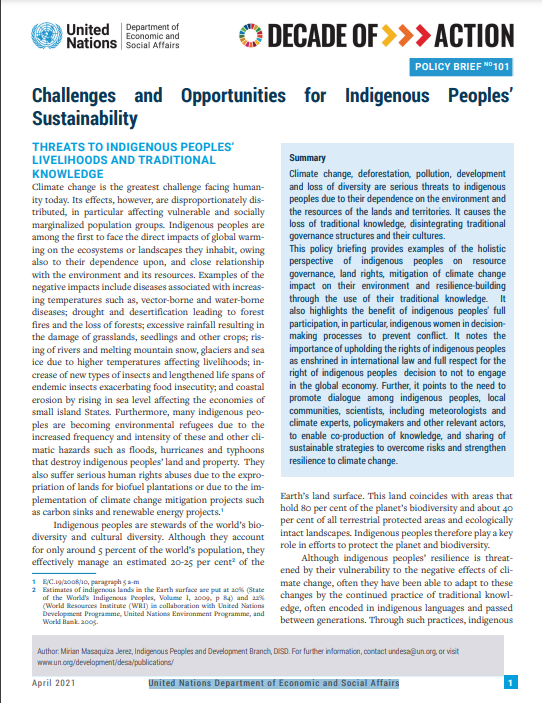
Challenges And Opportunities For Indigenous Peoples’ Sustainability
Publication Year: 2021
Abstract:
This policy briefing provides examples of the holistic perspective of indigenous peoples on resource governance, land rights, mitigation of climate change impact on their environment and resilience-building through the use of their traditional knowledge. It also highlights the benefit of indigenous peoples' full participation, in particular, indigenous women in decision making processes to prevent conflict. It notes the importance of upholding the rights of indigenous peoples as enshrined in international law and full respect for the right of indigenous peoples decision to not to engage in the global economy. Further, it points to the need to promote dialogue among indigenous peoples, local communities, scientists, including meteorologists and climate experts, policymakers and other relevant actors, to enable co-production of knowledge, and sharing of sustainable strategies to overcome risks and strengthen resilience to climate change.Climate change, deforestation, pollution, development and loss of diversity are serious threats to indigenous peoples due to their dependence on the environment and the resources of the lands and territories. It causes the loss of traditional knowledge, disintegrating traditional governance structures and their cultures.
Policy Brief No.: 101
Publisher/Organisation: United Nations Department of Economic and Social Affairs
URL:
https://www.un.org/development/desa/dpad/wp-content/uploads/sites/45/publication/PB_101.pdf
Theme: Indigenous People | Subtheme: Indigenous People Rights
Related Documents
Training Materials

How to Do Note: Seeking Free, Prior and Informed Consent in IFAD Investment Projects
Published Year: 2015
Abstract:
Free, prior and informed consent (FPIC) is an operational instrument that empowers local and i... Read More
Training Materials

Abstract:
This Manual aims to support and strengthen the work of national human rights institutions (NHR... Read More



